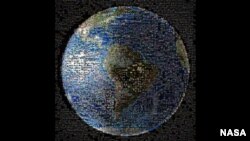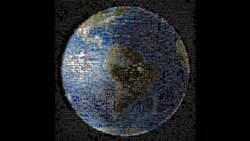On April 22, the United States observes Earth Day, an opportunity to reflect on the impact we have on the earth, and to consider how we as individuals can ensure that our impact is positive.
The first Earth Day, which took place in 1970, was planned as a national teach-in, a day to inform about environmental issues. In the 1960s, people in the United States were increasingly worried about the deterioration of the environment, the lack of regulation of pollution or the political will to do anything about it. The book Silent Spring, written by Rachel Carson in 1962, documented the effects of pesticides on the environment, and helped inspire a grassroots environmental movement that led to the creation of the U.S. Environmental Protection Agency.
Earth Day founder, United States Senator Gaylord Nelson, was an environmental activist who was outraged by lack of political response to environmental degradation.
More than 20 million people turned up for Senator Nelson’s first Earth Day on April 22, 1970.
Today, Earth Day is considered by many to be the birth of the modern environmental movement. It gave impetus to the passage of landmark environmental legislation in the United States, such as the Clean Water Act, the Endangered Species Act, and expansion of the Clean Air Act.
In 1970, the focus was on oil spills, industrial polluters, toxic dumps, the loss of wilderness, and the extinction of wildlife. Today, a main concern is climate change.
There is little doubt that human activity interferes with the earth’s climate systems. The UN Intergovernmental Panel on Climate, which met in Yokohama, Japan at the end of March concluded that climate change has already begun to affect crop yields, water availability, and species extinctions, among other impacts.
The Earth Day Network, the U.S. non-governmental organization that coordinates U.S. and international Earth Day events, has identified “Greening Cities” as the Earth Day 2014 theme. The United States’ government supports this theme, and will use the occasion of Earth Day to highlight other prominent U.S. global environmental policy priorities, including climate change and the health of the oceans.
“Unless we act dramatically and quickly, science tells us our climate and our way of life are literally in jeopardy,” said Secretary of State John Kerry. “No single country causes climate change, and no one country can stop it. But we need to match the urgency of our response with the scale of the science.”
“The clock is ticking.”
The first Earth Day, which took place in 1970, was planned as a national teach-in, a day to inform about environmental issues. In the 1960s, people in the United States were increasingly worried about the deterioration of the environment, the lack of regulation of pollution or the political will to do anything about it. The book Silent Spring, written by Rachel Carson in 1962, documented the effects of pesticides on the environment, and helped inspire a grassroots environmental movement that led to the creation of the U.S. Environmental Protection Agency.
Earth Day founder, United States Senator Gaylord Nelson, was an environmental activist who was outraged by lack of political response to environmental degradation.
More than 20 million people turned up for Senator Nelson’s first Earth Day on April 22, 1970.
Today, Earth Day is considered by many to be the birth of the modern environmental movement. It gave impetus to the passage of landmark environmental legislation in the United States, such as the Clean Water Act, the Endangered Species Act, and expansion of the Clean Air Act.
In 1970, the focus was on oil spills, industrial polluters, toxic dumps, the loss of wilderness, and the extinction of wildlife. Today, a main concern is climate change.
There is little doubt that human activity interferes with the earth’s climate systems. The UN Intergovernmental Panel on Climate, which met in Yokohama, Japan at the end of March concluded that climate change has already begun to affect crop yields, water availability, and species extinctions, among other impacts.
The Earth Day Network, the U.S. non-governmental organization that coordinates U.S. and international Earth Day events, has identified “Greening Cities” as the Earth Day 2014 theme. The United States’ government supports this theme, and will use the occasion of Earth Day to highlight other prominent U.S. global environmental policy priorities, including climate change and the health of the oceans.
“Unless we act dramatically and quickly, science tells us our climate and our way of life are literally in jeopardy,” said Secretary of State John Kerry. “No single country causes climate change, and no one country can stop it. But we need to match the urgency of our response with the scale of the science.”
“The clock is ticking.”






